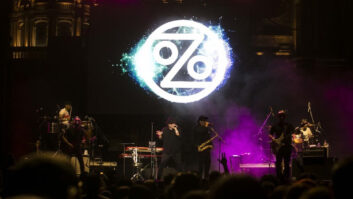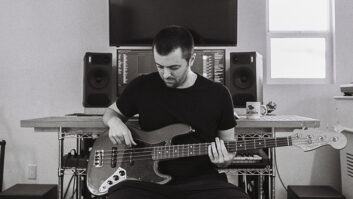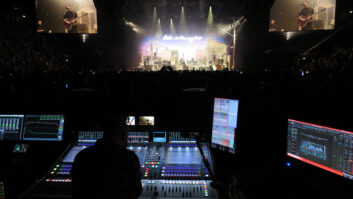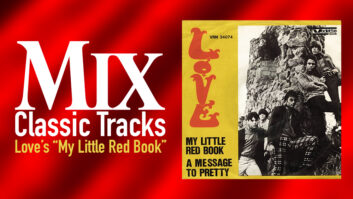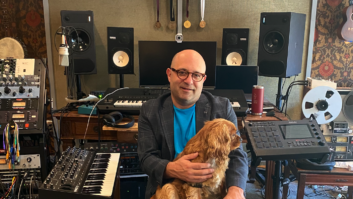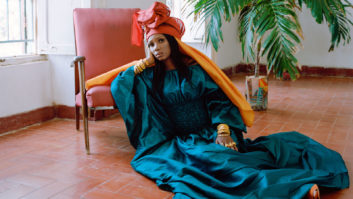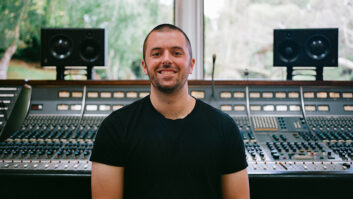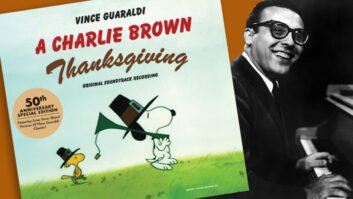Los Angeles, CA (November 20, 2018)—Producer Tony Berg moved his private Zeitgeist Studio this year into the legendary Sound City Studios, which he now occupies with producer, songwriter and musician Blake Mills. But before he relocated his facility, Berg produced My New Moon, a 10-song collection by Americana artist Amos Lee that Billboard has described as “the most personal and deeply felt” of all the artist’s albums.
Lee arrived with 40 songs, Berg reports. Those that made it onto this project, Lee’s seventh studio album, reference the impact of the February 2018 high school shooting in Parkland, Florida, and the August 2017 protests in Charlottesville, Virginia, as well as his encounters with individuals he met through the Wounded Warrior Project and Musicians on Call.
“Among our biggest problems was determining which songs would constitute this record,” says Berg, a former A&R executive with Geffen and Virgin who signed Beck and At the Drive-In, among others. “But as opposed to the dread I normally get when I hear that many songs, these were songs he had really invested himself in, heartfelt statements being delivered one after the other.”
Berg was initially drawn by Lee’s voice, he says, but more importantly, “I was struck by his intellectual curiosity, his commitment to what he does, and more than anything else, his sense of responsibility as an artist and a citizen. I know that sounds highfalutin’, but it could not have been more sincere or more impressive. I loved him for it right off the bat, and things only got better.
“We had what I would describe as a great time. A challenging time, because he’s a demanding guy in the best way, but ultimately a very gratifying experience.”
Berg had been working with artists at Zeitgeist for 34 years, recording hundreds, if not thousands, of songs. “It was a building in my backyard in Brentwood that I quietly turned into a serious place. It was a real destination for musicians in Los Angeles,” says Berg, now a resident of L.A.’s Eagle Rock neighborhood. Artists who have worked at Zeitgeist include Peter Gabriel, Squeeze, Ed Sheeran, Aimee Mann, Michael Penn, Moses Sumney and Ted Hawkins.
“I had the API console from Record Plant in New York, from 1970, and maybe 400 instruments—a lot of stuff,” he says. “What I’ve done is transplant the entire studio into Studio B at Sound City.”
Lee’s song demos were stripped down, Berg recalls, but that dovetailed with his collaborative spirit. “I have such a strong opinion about harmonization, lyrics, subtext and sonic footprint that the pre-production process is as important for me as the production itself.”
He continues, “I like the immersion, the three-month period of pre-production, then casting musicians, rehearsing, then going in a room. That was a little more difficult at my home studio, but now that I’m in Sound City, I’m able to do that with a band as often as I like.”
Berg brought in some of his first-call collaborators to flesh out the songs, including multi-instrumentalists Ethan Gruska—with whom he is now recording an album—and Blake Mills, keyboard players Benmont Tench and Patrick Warren, Greg Leisz on pedal steel and Rob Moose on strings. “And Chris Dave is a drummer like no other,” Berg marvels. “We did a day with him that was mind-blowing for everyone involved.”
Working with Lee for the first time on the record was a revelation. “You discover an artist’s strengths as you begin to work together. Aside from this voice that is just so powerful and uniquely his own, he has this incredible skill at building background vocals, almost like no one I’ve ever worked with. He goes boom, boom, boom and suddenly you’ve got this sound that is irresistible. That was a great experience, working with someone as adept and creative as he is.”
Zeitgeist was something of an incubator for engineering talent—Shawn Everett, now a Grammy-winner for his work with Alabama Shakes and the War on Drugs, spent 12 years working in Berg’s backyard. On this project, says Berg, “I had three or four engineers and recordists who participated and were just extraordinary. David Boucher and Joseph Lorge are great engineers, and Tchad Blake is, for me, among the finest mix engineers who ever lived. Then I had Bob Ludwig master it; if there’s someone better, I’d like to know who it is.”
Berg is decidedly old school when to comes to gear, but he’s also flexible. “Every project tells you what is appropriate. In this case, Pro Tools was the way to go,” he says.
Not that he won’t occasionally rack up a reel of 2-inch: “I have a Studer 827 that I love, and I produced an Andrew Bird album two years ago that we did on tape.”
There’s a reason why he collects and favors vintage gear, he says. “The color that gear brings is what I’m most enamored of. When I hear people talk about transparency of sound, I think, what I really like is something with a sonic imprint. That’s why we like LA-2As and 1176s and APIs—they have color. Pro Tools is the neutral factor.”
He tends to use Pro Tools primarily as a recorder. “My skill set derives more from using old boxes. I find that a preponderance of plug-ins creates a fatigue in the listening experience that I can’t quite explain. It’s something I’ve always been aware of, so I am cautious when I see 10 plug-ins stacked on top of each other.”
Berg has come to be more flexible as a producer, he says. “When I was younger, I might have been a little more dictatorial. The more I’ve done this, the more I’ve realized that it’s not my album. It’s the artist’s album, and it’s my job to help the artist achieve what he or she might be after, and maybe even go beyond what the artist had hoped for. And Amos could not have been a better collaborator.”
Ultimately, he says, “What I really believe is that there’s no [single] system and one should never adhere to an orthodoxy. I think every album should be treated as unique—because every album must be unique. Otherwise, what are we doing?”
Amos Lee • www.amoslee.com
